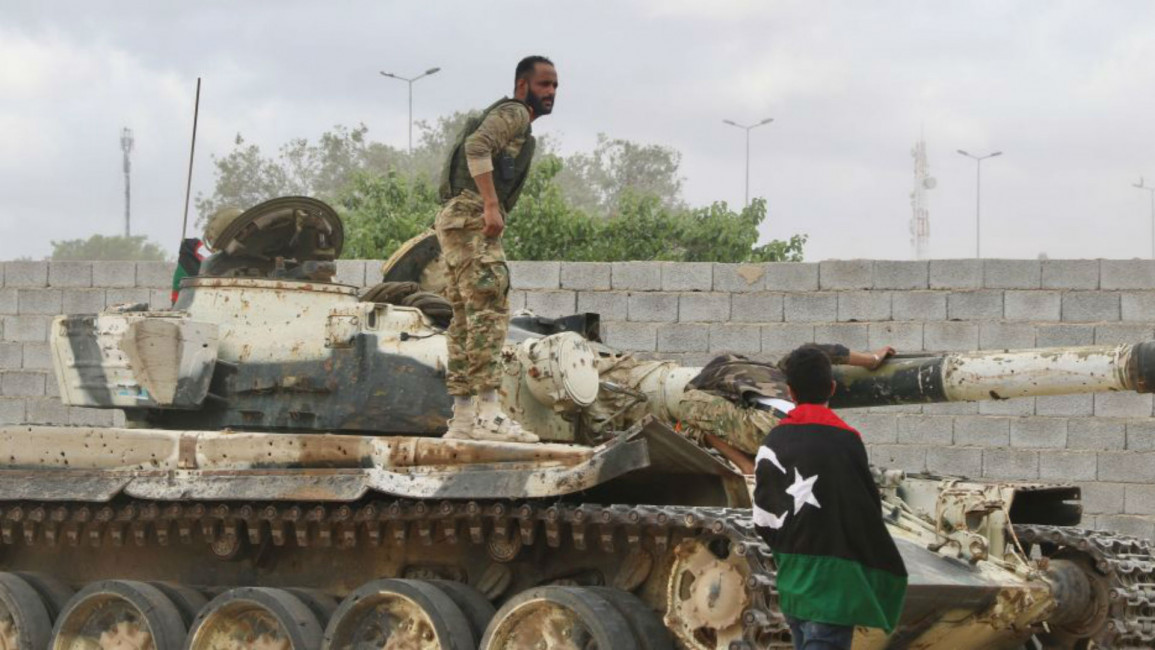
Haftar may be on back foot, but for Libyans the struggle is far from over
Given al-Watiya's key location south of the capital Tripoli, on which Haftar's self-proclaimed Libyan National Army launched its offensive in April last year, this is evidently a setback for Haftar. The Government of National Accord's (GNA) forces also seized the LNA's Russian-made Pantsir-S1 air defence system from at-Watiya last Saturday. The defence system was supplied by Haftar's key patron the United Arab Emirates, and GNA air forces have since destroyed more vehicles and bases, including in Tarhuna on Wednesday.
This comes after a string of recent GNA military victories in western Libya. With Haftar struggling to capture Tripoli and impose his desired military dictatorship on the entire country, despite his renewed offensive in November, the GNA and its Turkish backers are now increasingly dominant.
Yet the Libyan warlord will not stand down. In desperation, after losing ground in western Libya, Haftar proclaimed a "popular mandate" from the Libyan people in April while scrapping the 2015 Shirkrat Agreement which called for a unity government the GNA, a move which likely came with Emirati prodding. Yet Haftar had already revealed his true intentions with his campaign to capture Tripoli, and his hasty exit from peace talks in Moscow in January. Clearly, peace was never in his or his external backers' interests.
 |
Haftar's recent defeats lay waste to the idea that he is impenetrable |  |
On Wednesday, Haftar's forces launched an airstrike on Jendouba, near Gharyan south of Tripoli, while the LNA still relentlessly fires missiles on the capital. Haftar's delusions of grandeur will likely keep him committed to his campaign. Furthermore, Turkey's gains may not be enough to completely push back Haftar.
A more protracted war is therefore more likely, and various Haftar-controlled areas will be continuously disputed, while Haftar will seek to recover his losses, should no end to the conflict be sought.
Furthermore, while Haftar's forces are still strong in eastern Libya, his recent defeats lay waste to the idea that he is impenetrable, even with international backing, and he may very well lose morale and internal support within the LNA's eastern territories.
Twitter Post
|
Yet Haftar's backers and foreign powers will continue their interventions; the UN arms embargo faces persistent defiance, and a state of lawlessness reigns over Libya.
Despite suggestions that Haftar's key backers, namely Russia, Egypt, France and the UAE, may grow increasingly weary of Haftar should his defeats render him more of a liability than an asset, and may even be prepared to drop him, there would be little hope for a unilateral rejection of Haftar, and he may still be used to support these external interests.
Read more: Foreign mercenaries and fractured healthcare heighten Libya's coronavirus risks
UAE rulers would hate to witness a stable, democratic and Turkey-friendly government emerge in Tripoli, and would prefer to keep its rival Ankara bogged down in the country. Egypt has similar concerns; since it supports Haftar to secure its eastern border, it may also continue its involvement, should GNA forces make further inroads. Emirati and Saudi prodding would also keep Cairo in line.
Abu Dhabi may also seek to secure Haftar's presence over eastern Libya, to guarantee some influence over the country. This risks delivering a de-facto but unofficial partition, similar to a situation it has pursued in south Yemen.
Meanwhile, the Berlin Conference gave Ankara greater justification to intervene against Haftar's offensive, though outcomes remain unclear. Many regional states, including Greece, Cyprus and Syria's Assad opposed the intervention, meaning Libya may be another battleground for those trying to curtail Ankara.
Tragically, peace initiatives and coverage of this messy conflict often forget its human cost. Reporting on Libya often mires the humanitarian crisis beneath concerns of Islami State's limited presence, and how the country serves as a hotspot for asylum seekers crossing into Europe; in essence - issues that affect the West, effectively presenting the country as something of a nuisance. This has often led to Europe's neglect of the country, and ultimately its people.
Libya is labelled the "ignored war", as civilians face a humanitarian crisis due to displacement, a failed state and a collapsed economy and services from nine years of conflict. Such conditions, along with the influx of mercenaries now also compound Libya's vulnerability to coronavirus.
 |
Haftar's delusions of grandeur will likely keep him committed to his campaign |  |
Whatever the outcome, Libyans still have litte say over who controls their future. Local leaders are neglected in international peace talks which merely serve the whims of the external actors involved. The country holds a mirror to the present reality of various regional conflicts, where people's lives are used as pawns in greater power games.
Foreign actors with no interest in a peaceful, stable Libya should abandon their interests and support the Libyan people in determining their own future. Others, like the United States and the European Union should certainly step up their game and push for a more serious peace settlement. The immediate priority should be to confront their Gulf allies and others who are defying peace hopes.
NATO's intervention during Libya's 2011 revolution, which simply toppled Gaddafi and then abandoned the country without supporting a subsequent stable political settlement, shows there has been an absence of respect and understanding towards Libya's domestic circumstances and dynamics.
Libyans themselves should be given a voice, and a genuine desire to improve livelihoods should be at the core of the West's hopefully more proactive re-engagement in the country.
Jonathan Fenton-Harvey is a freelance journalist.
Follow him on Twitter: @jfentonharvey
Opinions expressed in this article remain those of the author and do not necessarily represent those of The New Arab, al-Araby al-Jadeed, its editorial board or staff.




